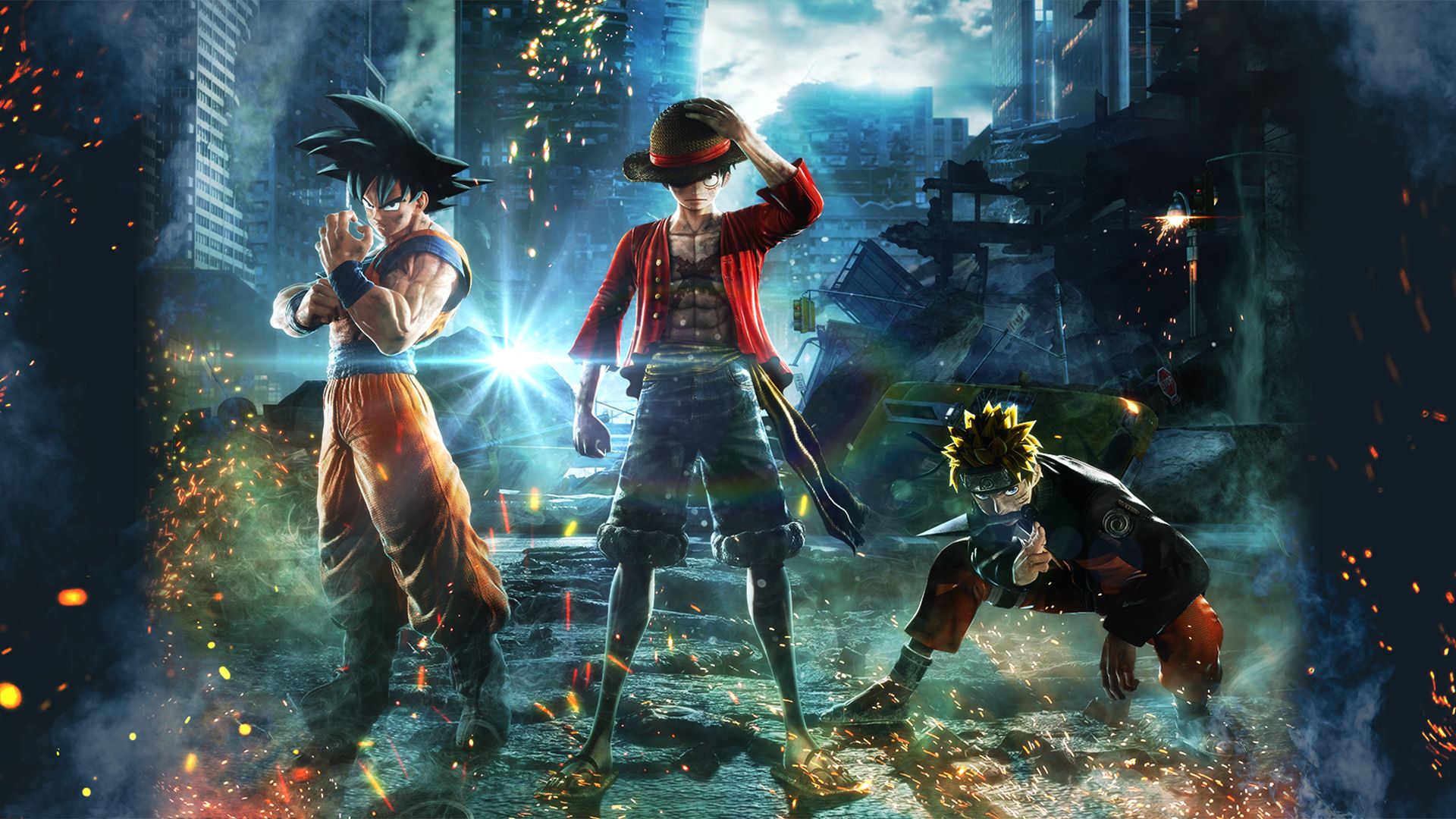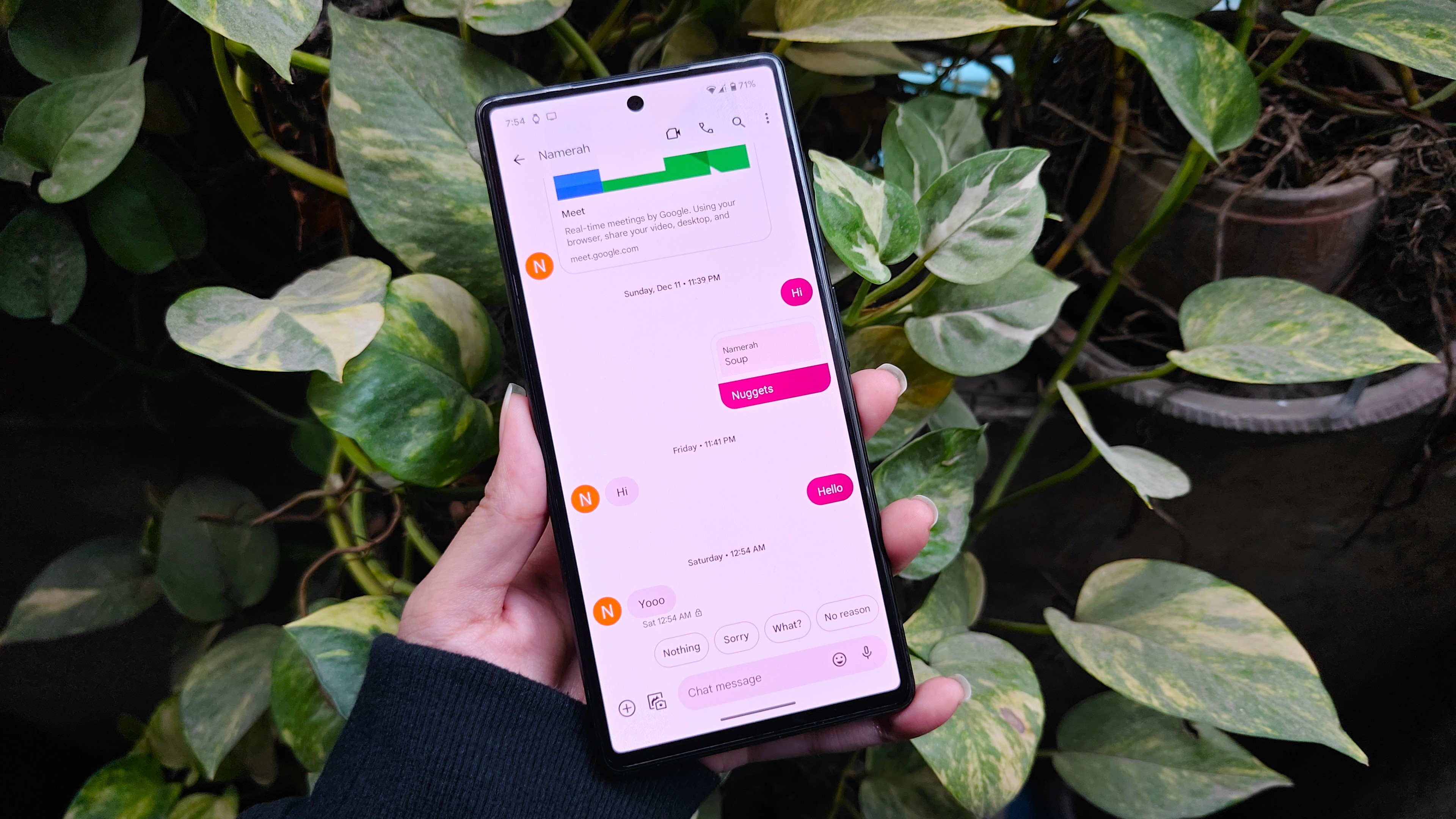Shonen Jump, one of the most iconic manga publications out there, is celebrating its 50th anniversary this year, and Bandai Namco was tasked with making the ultimate game to celebrate. That game is Jump Force, an anime mashup featuring characters from all your favorite Weekly Shonen Jump series.
It seems easy. Some of the most iconic manga of all time —Naruto, Dragon Ball, One Piece, My Hero Academia, Hunter x Hunter, Yu-Gi-Oh, Yu Yu Hakusho, and more — are all represented here. The source material is big and showy, so the game has to be big and showy. These are fighting characters, so the fighting gameplay is practically built in. With so many great characters and fanservice, all we needed was a decent game.
Jump Force is some of those things. Unfortunately, there's a lot to take issue with when you really start to dig in and fans should be disappointed.
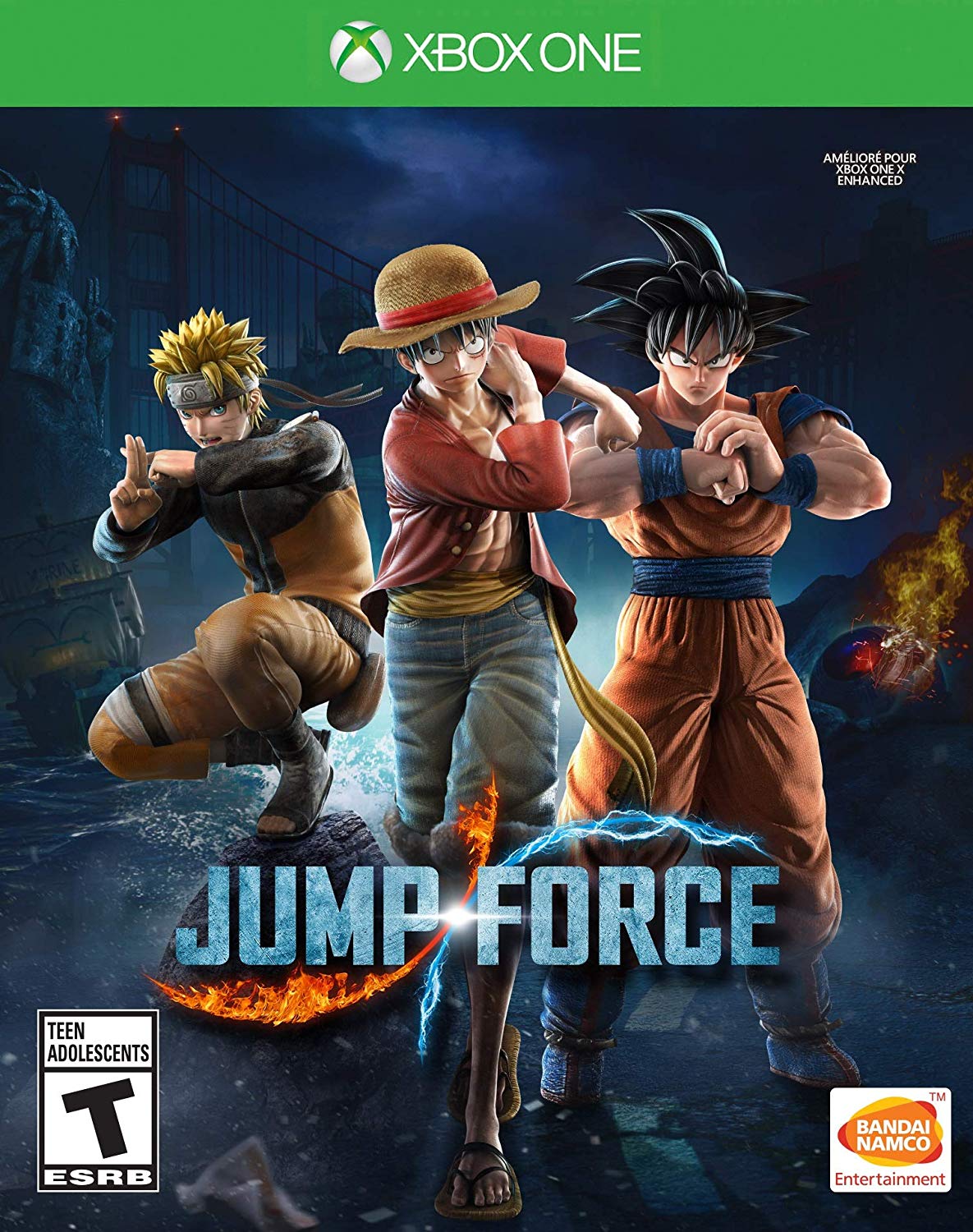
$60Bottom line: Everything about Jump Force screams shameless cash grab, and that's a shame because it easily could have been a game changer.
This is one sad celebration
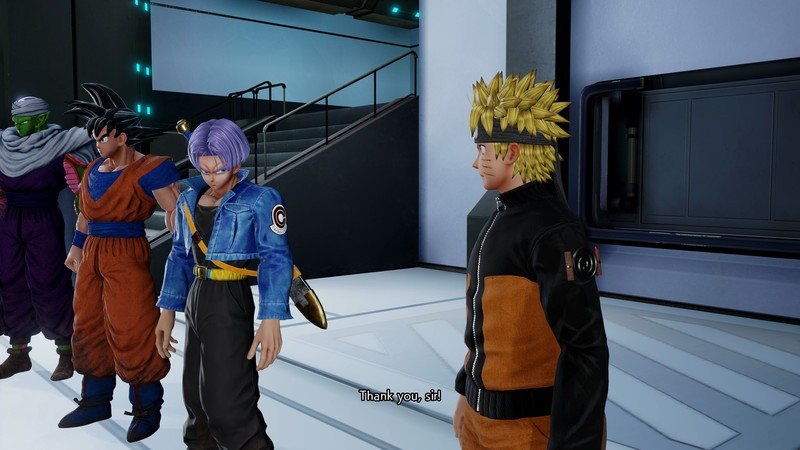
Jump Force merely had to be competent, if nothing else. No one was ever expecting it to take EVO by storm or turn the world of fighting games on its head. We just wanted a good fighting game with all our favorite anime characters. How could it possibly go wrong?
I'll tell you how: because this game isn't the celebration that Shonen Jump deserves. It's more a shameless cash grab by Bandai Namco, who took what should have been a momentous occasion and decided to perverse it. It had the opportunity to create the last anime game we'd probably ever want to play, but instead took a ton of shortcuts to rush something out of the door.
The entire point of Jump Force is to get closer to the characters you love. It's hard to do that when they're presented in such a putrid light.
This neglect is apparent all throughout the game, but it's most noticeable in Jump Force's easily forgettable story mode. The plot is actually not half bad for a fighting game (it's not the main focus, after all), but the execution is doing it no favors. While there are moments of cheeky references strewn throughout as characters from entirely different worlds interact, they don't happen frequently enough for my liking. To make matters worse, most of the cutscenes are driven by text; the game doesn't offer fully voiced lines, so a majority of these interactions don't even come through in a natural way.
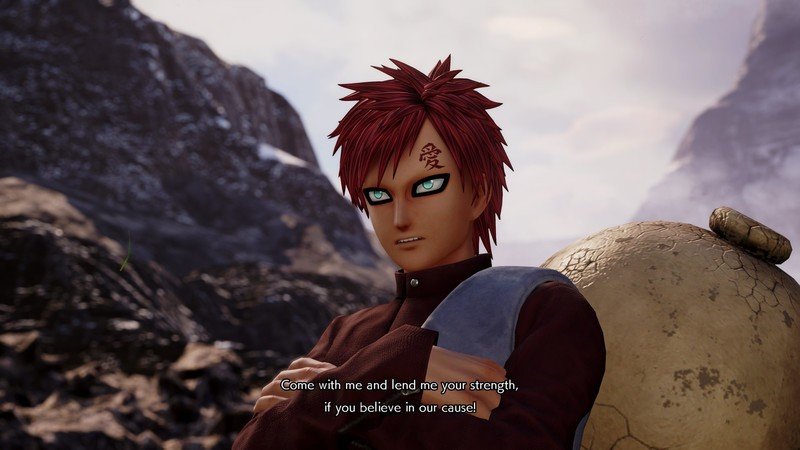
I was disappointed by the contents of the story in general. It begins with you choosing to join one of three teams, one each for the Naruto, Dragon Ball, and One Piece universes. These teams work together to stop common villainous enemies, all of it culminating in an epic final showdown. It's not the most terrible excuse to set up glorified exhibition matches, but no one is going to be talking about how masterful Jump Force's story is years from now.
Even a weak story can work with the right cast and characters, but I feel the ball was dropped here too. Jump Force gets all the obvious names in, but other questionable choices make its 40-count roster feel less exciting than it should be. We needed either more character slots (they wasted two slots on original characters that were made specifically for story mode) or better character choices.
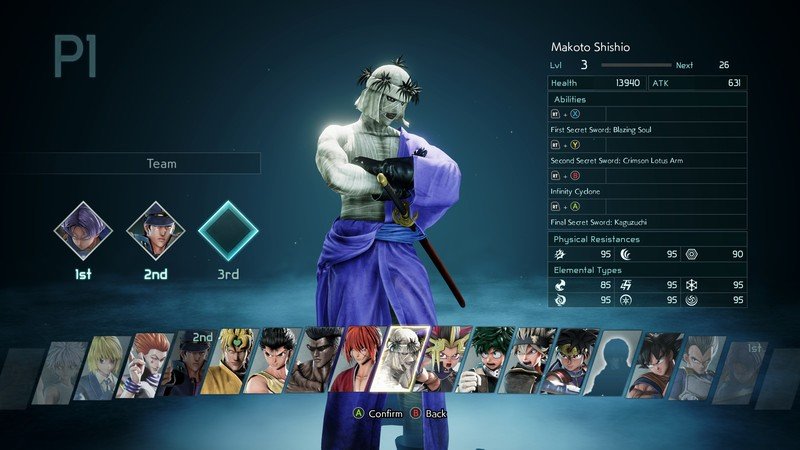
While strong, Naruto's Kaguya is one of the least relevant characters in her series. That slot could have easily been awarded to someone like Jiraiya or Tsunade, or perhaps a villain like Orochimaru. In the realm of Dragon Ball, Cell could have been sacrificed for a more exciting option like Android 17. Also, if Light Yagami and Ryuk of Death Note fame are eligible for this supposed celebration, why didn't we get any characters from Death Note — one of the best and most popular titles in anime — in playable form? And why couldn't we get more cameos from others who were snubbed?
You can argue against a bigger roster size as it allowed Bandai to craft each character with more care (which comes through in the gameplay department, more on that later), and that's a fine tradeoff. However, there's no inherent excuse for overall poor character choices. The result is a top-heavy list of names that just tumbles off a cliff.
And that's not considering the myriad technical issues I encountered. The dialog is carried out in cutscenes where characters are so stiff that they sometimes seem devoid of life. Rarely do they move, and if they do, it can look robotic.
Facial animations are largely stone cold. They bring back horrid memories of pre-patched Mass Effect Andromeda with awkward expressions that don't fit the context of the situations. Characters sound far more passionate than they appear, a nice point for the excellent Japanese voice actors who lent their talent for the game, but not conducive to the end goal of providing content that's actually enjoyable to play (speaking of which, there was no English localization for voiced lines whatsoever, so if you can't understand Japanese then expect to do a lot of reading).
Here is where I would normally forgive Jump Force's story mode for being a tacked-on afterthought that wasn't really expected to deliver something breathtaking in the first place (especially since many games in this genre don't even opt for full character models in cutscenes), but that's a stance I'm not willing to take.
The entire point of Jump Force is to get closer to all the characters you know and love, and it's kind of hard to do that when they're presented in such a putrid light. I'm also of the general opinion that if it's in the game, it should feel complete, and this isn't that.
Jump Force is much better when it's time to fight
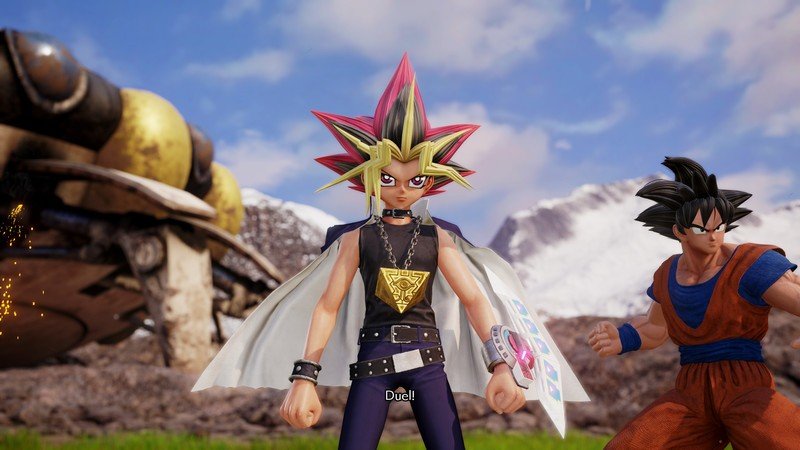
Things aren't as bad when you're not forcing yourself to slog through a weak campaign. Jump Force is a much more respectable game if all you're interested in is the core fighting.
What we have here is an arena-style combat experience on a 3D plane featuring strict teams of three. You can tag them in and out at will, or they can simply help you pull off bigger combos before heading back to the sidelines. Your teammates share all resource meters, so the game becomes less about shuffling and juggling and more about dodging incoming damage.
As with many of Bandai's mainstream anime titles these days, Jump Force features a simplistic fighting engine with only a handful of button combinations used to pull off all your moves, and the control scheme is the same for each and every character in the game.
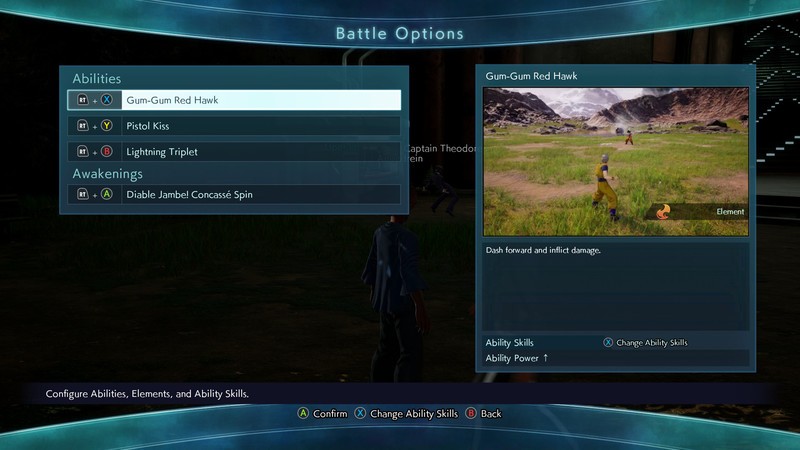
This can be good and bad. It makes it easy for new or lesser players to pick up and play, and it even gives them hope that they can beat some of the tougher fighters. On the flip side, more experienced fighting game players may eventually master the fighters too soon as if you've played them once, you've kind of played them all.
That said, there is gameplay nuance that'll satisfy more serious players. There are stamina and energy bars to maintain, both of which dictate the stuff you can do in battle. You can't charge at your opponent without stamina and you can't pull off crazy looking combos without a lot of energy. Well-timed tag team attacks hit harder and keep your opponent guessing. An embarrassment of movement capabilities let you chase opponents down or seek safety from devastating attacks. Counter attacks give you a clean way to open your enemy up to damage while stopping the barrage of their own.
I also like how the teambuilding aspect of Jump Force works and I feel this will be one of the deepest areas for hardcore players to key in on. You can only cycle through your teammates in a specific order (that the player sets before each match), so you can set your team up so that the next fighter in line will synergize better with whoever is currently in the fight. This edge isn't overwhelmingly potent, so it's perfectly fine for the more casual players to build their teams based on personal taste.
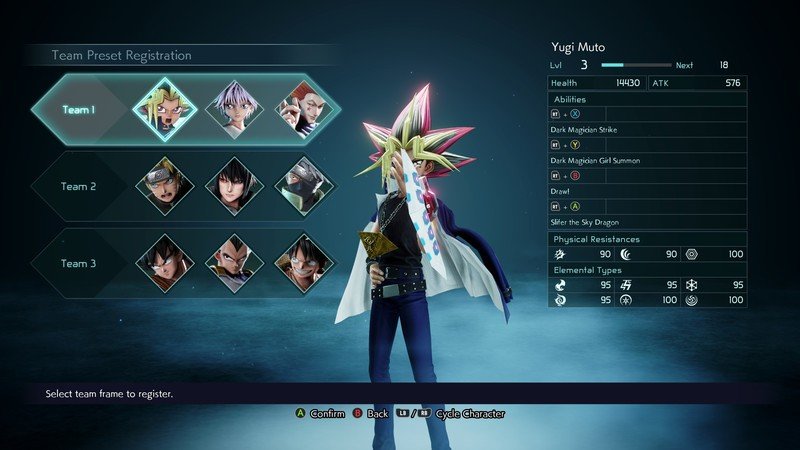
I also like that the characters maintain their own experience level, have unique strengths and resistances, and even offer different attack damage and health stats. This adds incentive to really get to know your preferred teammates, as the more you play with them the more capable they are. They can also be propped up with temporary power-up consumables and permanent upgrades on an individual basis.
It's not perfect, but Jump Force feels very good to play.
Characters have slightly different fighting styles, with the range being one of the most prevalent differentiators. I found it helpful to use balance when making my teams, with a typical trio of melee offense, ranged offense, and utility helping you cover your weaknesses while amplifying your strengths. The classic fighting game trope of quick moves hitting softer than slower ones is alive and well in Jump Force, so the game rewards you for trying all the different characters and finding the perfect one for you.
If you're not happy with some of the characters available to you, Jump Force gives you the option of creating your own. Customization options felt a bit limited for anatomy options, and clothing wasn't much better, but you can buy more items from the in-game shops. Thankfully, there are some diverse hair and facial options available, so you may be able to create some of those characters you wish were in the game. I've already seen a Saitama (One Punch Man) and Sakura (Naruto) running around the shared online hub.
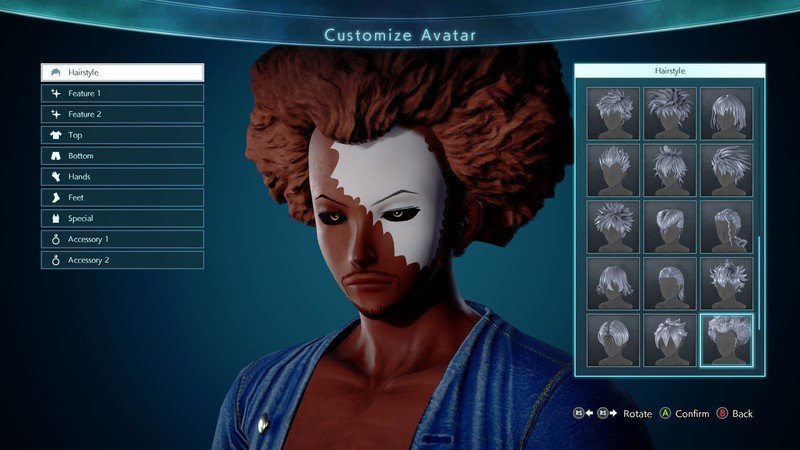
The game is more rigid when it comes to fighting style options for your custom characters. You get three basic styles, and while you can customize all four of your special abilities, you can only use abilities that the characters in the game are already hogging. It's better than nothing, but there's definite room for improvement here.
Jump Force also rewards you by being a beautiful game in general. Story mode grievances aside, the presentation in-fight is very slick. Characters are presented with a 3D art style that uses strong contrast and shadows to make them stand out. I was a bit skeptical about the developer's ability to settle on a style that makes each fighter look natural, especially since drawing and animation styles can differ wildly from one anime to the next.
I'm glad to say those fears are unwarranted. No one, in particular, stands out like a sore thumb, and that's more important than staying true to original depictions. My only complaint is that we didn't even get any alternate costumes for the anime characters, something I find to be unforgivable in a game like this.
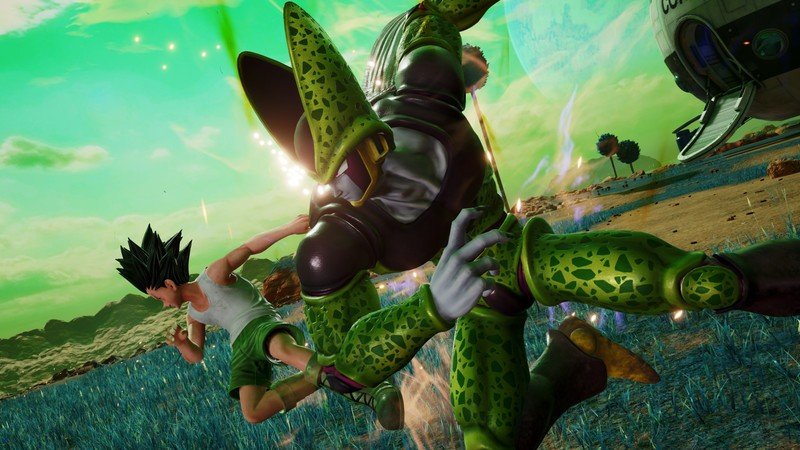
More than just the character models, the animations and special effects you see when attacks and special moves are performed clearly got most of the development effort. There's nothing quite like seeing Naruto's massive demon form when he hits his Ultimate Awakening, and a well-placed Kamehameha always jerks that bit of nostalgia out of me. These are the things you play this kind of game for, and they nailed it.
The stages you fight in are characters all on their own. Jump Force is pretty. Environments are lush and rich in detail; water reflections look really refreshing; smoke and debris float across the screen to add depth and substance to the urban scenes. Just when you thought you had enough sightseeing, you can break the stages with certain moves to go to an entirely new area. Anime and huge set-piece battles go together like cheese on popcorn, and that's one thing Jump Force does absolutely right.
There are a couple of issues worth pointing out. You'll often go for a grab only for your fighter to completely whiff despite seemingly connecting with your opponent. More rarely, some special moves seem to connect even when the point of attack misses a fighter's hitbox, though this doesn't happen nearly as often as the failed grabs. Clipping and hitbox issues aren't uncommon in video games, but they're only acceptable when they don't screw up major mechanics or offer unfair advantages.
Lastly, matches seem to take ages to complete. There were too many instances where the match was decided by the 99-second time limit instead of a knockout. We either needed custom timers or weaker health bars. Hopefully, these issues will be ironed out in a future update.
Jump Force is a one trick pony
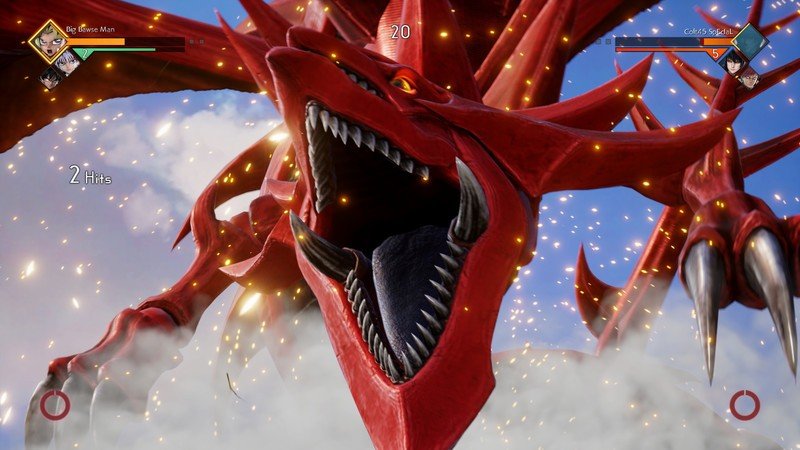
Like many other developers, Bandai Namco has become fond of these shared world hubs that get you to and from the game's various activities. It's a place where you can walk around with your avatar and see people going about their business as they prepare for the day's games. I've never been a big fan of these worlds as I feel they pad your gaming sessions with unnecessary navigation time. Sometimes, I just want to load the game up and jump right into a match using regular old menus.
The layout of the world is at least sensible in Jump Force. One central kiosk for online and offline battles means you'll never have to walk very far to get into your matches. The various stores and information desks are more scattered, but you can navigate to any station you want by bringing up the minimap. This is a nice compromise for gamers like me who can't care to pretend they're immersed in these staging areas.
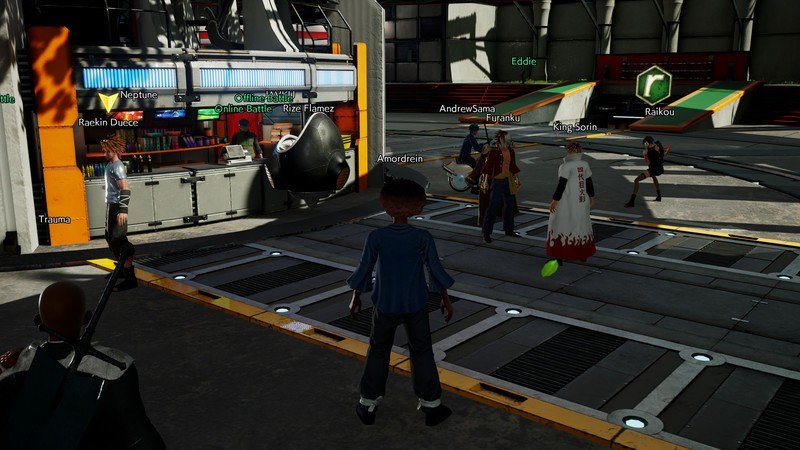
Fighting games have spent this generation exploring new gameplay models and experimenting with additional ones to try and draw more interest from the casual public. Jump Force is not that game. It sticks to its guns as a pure fighter, so if you were hoping for some fun little side modes or a completely fresh take on the genre, look elsewhere.
This wouldn't be an automatic negative for Jump Force if other areas of the game showed a higher level of polish from extra development time and focus, but that's not the case. The game is frustratingly bare in your options for online play. You can play ranked or unranked head-to-head matches and, well, that's literally it.
Glaring issues and omissions make it hard to enjoy Jump Force's excellent gameplay.
I can't say I wasn't disappointed at the lack of a lobby system where you and all your friends can join in and take turns fighting while spectators wait their turn. There's not even a rematch button, with each player having to suffer through even more of those loading screens to get in and out of battles.
Events are another piece of the Jump Force online puzzle. The entire structure of the game revolves around this team concept where you're doing your part for your team — Alpha, Beta, and Gamma for Dragon Ball, One Piece, and Naruto, respectively — to try and fight back against evildoers.
Events are supposed to promote team pride, with those belonging to the most active team being entitled to rewards at the end of short seasonal periods. You're alerted every moment that you earn points toward this objective, but we don't know what the objective is, how long it lasts, or how much of a lead your team has over others. It's kind of just… there, and not interesting at all. Heading to the events counter prompts a message letting you know which team is winning, and that's all you get. It's designed to light a fire, inspire pride, or make me jealous, but it fails at all of those things and I find myself not caring.
Jump Force Bottom line
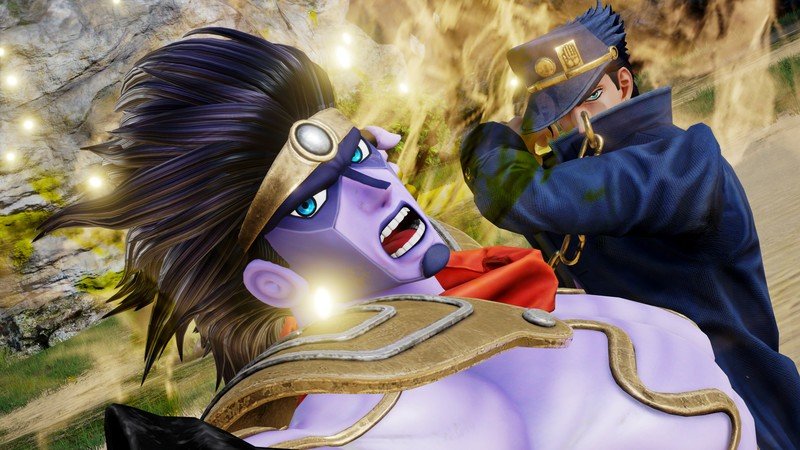
Jump Force is disappointing. The core gameplay is there, but almost everything else about this game is shamefully shallow. I would have forgiven it as the celebratory anniversary present that Bandai Namco advertised it to be, but it doesn't even manage to do that correctly.
The story mode is awful, online is frustrating, and the roster could be much better. It looks stunning visually, but worlds are supposed to be colliding and the characters don't always play up those circumstances in any meaningful way. And even the most impressive part of Jump Force — gameplay — is currently in need of fixes for some glaring issues that somehow made their way past the quality assurance department.
2.5 out of 5
None of these issues are enough to bring a fighting game down on their own, but together they make for an excruciating exercise in patience, and I might have been able to find that patience if the game at large had more to offer. Its hyper-focus on gameplay does it no favors in that regard. Wait for a sharp discount if you must have it.

All your favorite anime characters are here.
Jump Force brings dozens of Shonen Jump's most popular characters together for a massive anime showdown.
Quentyn reviewed Jump Force on an Xbox One X console using a copy provided by Bandai Namco.
